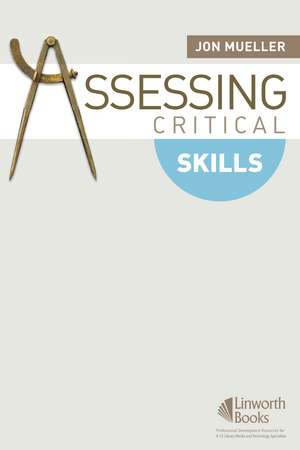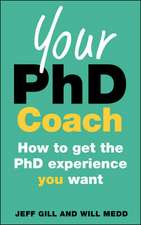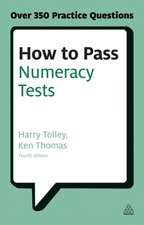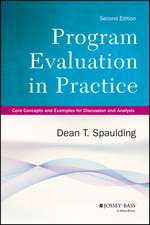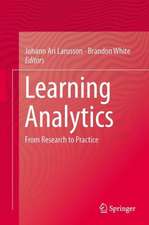Assessing Critical Skills
Autor Jon Muelleren Limba Engleză Paperback – 14 oct 2008 – vârsta până la 17 ani
Preț: 260.94 lei
Preț vechi: 319.67 lei
-18% Nou
Puncte Express: 391
Preț estimativ în valută:
49.94€ • 51.84$ • 41.64£
49.94€ • 51.84$ • 41.64£
Carte tipărită la comandă
Livrare economică 24 martie-07 aprilie
Preluare comenzi: 021 569.72.76
Specificații
ISBN-13: 9781586832827
ISBN-10: 1586832824
Pagini: 144
Dimensiuni: 152 x 229 x 8 mm
Greutate: 0.2 kg
Ediția:1
Editura: Bloomsbury Publishing
Colecția Linworth
Locul publicării:New York, United States
ISBN-10: 1586832824
Pagini: 144
Dimensiuni: 152 x 229 x 8 mm
Greutate: 0.2 kg
Ediția:1
Editura: Bloomsbury Publishing
Colecția Linworth
Locul publicării:New York, United States
Notă biografică
Jon Mueller is a professor of Psychology at North Central College in Naperville, IL.
Recenzii
Assessing Critical Skills is an invaluable step-by-step guide to implementing authentic assessment. The author's online text, Authentic Assessment Toolbox greatly complements the book with further resources. Highly recommended.'
Library media specialists learn the process and value of designing assessments that match critical skills in Assessing Critical Skills, a definitive work on assessment designed for educators and librarians alike. Chapters discuss matching assessment to curriculum needs, provides guidelines and examples, and offer step-by-step rubics and checking processes. Any educator's library needs this.
The weakest link in the inclusion of critical skills in the curriculum has been assessment. These skills that are so necessary for the workplace and personal life include problem solving, critical thinking, and self-assessment, as well as locating, evaluating, and communicating information. Assessing these sklls, however, requires different instruments from the traditional test. This professional book is a toolkit for the educator who is willing to incorporate critical skills into instruction, but who needs assistance in creating authentic assessments or is looking for new ideas in testing instruments. An explanation of authentic assessments is followed by steps in the development of instruments for evaluation of skill development. Formative and summative assessments are given for each scenario. Rubrics for rating performance for a variety of tasks across the curriculum are a key part of this book. These rubrics include solo audition, evaluation of research claims, paragraph task, and analyzing group collaboration. One chapter focuses on assessing the ability to monitor one's progress and performance, while other chaptes focus on measuring information literacy skills and collaborative skills. Educators who are familiar with current research in curriculum development and assessment will recognize many names in the extensive list of references. It will be a very valuable professional resource for any library serving educators. Classroom teachers and curriculum developers will probably want their personal copies as well.
Library media specialists learn the process and value of designing assessments that match critical skills in Assessing Critical Skills, a definitive work on assessment designed for educators and librarians alike. Chapters discuss matching assessment to curriculum needs, provides guidelines and examples, and offer step-by-step rubics and checking processes. Any educator's library needs this.
The weakest link in the inclusion of critical skills in the curriculum has been assessment. These skills that are so necessary for the workplace and personal life include problem solving, critical thinking, and self-assessment, as well as locating, evaluating, and communicating information. Assessing these sklls, however, requires different instruments from the traditional test. This professional book is a toolkit for the educator who is willing to incorporate critical skills into instruction, but who needs assistance in creating authentic assessments or is looking for new ideas in testing instruments. An explanation of authentic assessments is followed by steps in the development of instruments for evaluation of skill development. Formative and summative assessments are given for each scenario. Rubrics for rating performance for a variety of tasks across the curriculum are a key part of this book. These rubrics include solo audition, evaluation of research claims, paragraph task, and analyzing group collaboration. One chapter focuses on assessing the ability to monitor one's progress and performance, while other chaptes focus on measuring information literacy skills and collaborative skills. Educators who are familiar with current research in curriculum development and assessment will recognize many names in the extensive list of references. It will be a very valuable professional resource for any library serving educators. Classroom teachers and curriculum developers will probably want their personal copies as well.
